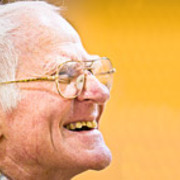
Martyn Sanderson
The late Martyn Sanderson, ONZM, who passed away in October 2009, was a writer, poet, and co-founder of Wellington's Downstage theatre. He was probably best known for having one of the most distinctive voices in New Zealand acting, and his appearances in 26 movies.
In real life, Sanderson spent time in communes in the Hawke's Bay, and made films in Australia and Samoa. On screen, he portrayed Kiwi legends Frank Sargeson (An Angel at My Table) and Richard Pearse, yelled at rugby coach Grizz Willie (Old Scores), and was spectacularly killed in both Utu and The Fellowship of the Ring. His performances reinvigorated many stereotypes of the Kiwi male — commonsense everyman, defiant individualist, narrow-minded parent.
Born to a missionary father and a writer mother, Sanderson directed his first play while studying literature at Oxford University. After trying theology at Cambridge, he abandoned plans to become a priest, and married future ceramicist Liz Earth.
After returning to New Zealand, Sanderson discussed setting up a professional theatre company, with writer Peter Bland and actor Tim Eliott. Sanderson envisioned a small group of actors and writers, and and an intimate style, "bringing it down amongst the people." His agenda was "to change the whole of society". Downstage, which would become one of New Zealand's most noteworthy theatres, opened in September 1964 with Zoo Story, one of many Downstage plays to star Sanderson (often alongside Bland). Bruce Mason called it "the most promising omen in New Zealand theatre for years".
In 1969 Sanderson moved to Australia, where he began twin habits that would last decades: acting for the screen, and working on his own documentaries. His disregard for convention was already clear. While acting in the movie Ned Kelly (starring Mick Jagger as Kelly!) he worked on off-beat documentary A Stone in the Bush, then began A Stitch in Time, which mixes electronic sounds and Sanderson's poetry, with images of sewing and moviemaking.
In 1972 the Sanderson family relocated to the Hawke's Bay, to live communally at Waimārama with the families of three other emerging talents: Bruno Lawrence, Alun Bollinger, and Geoff Murphy This period glimpsed in Sanderson's documentary Charlie Horse. The creatively-fertile period saw Sanderson touring with Lawrence's multi-media group Blerta, and playing lead villain in Blerta movie Wild Man (1977).
Echoing his twin contributions to Wild Man, he also acted in, and was principal scriptwriter on, 1979 movie Solo, a romance involvlng a forest-loving solo father and an Australian hitchhiker. Sanderson had begun writing for the screen while in Australia, and would later co-write acclaimed Bruno Lawrence feature Heart of the Stag, and a dark and little-seen Ronald Hugh Morrieson adaptation, Pallet on the Floor.
On television, Sanderson won a Feltex Award in 1976 for his portrayal of aviation pioneer Richard Pearse. He was nominated again for the fifth episode of historical TV epic The Governor — he played a conflicted general, who is ordered to expel Māori villagers from their lands. The same year he worked with director Barry Barclay on a more personal piece: Autumn Fires, which looked into his own colourful family.
In the 1980s, Sanderson turned increasingly to the big screen. Aside from providing arguably one of Kiwi cinema's finest narrations, for Ronald Hugh Morrieson's gothic tale The Scarecrow (1982), he contributed memorable portraits of the Kiwi male to Bad Blood, Trial Run and Beyond Reasonable Doubt (the last as murder suspect Len Demler).
Sanderson was also working again as a scriptwriter and director. By 1985 he had directed Keskidee Aroha, shorts featuring poetry by Denis Glover and Alistair Campbell, and a half-hour drama, Universal Drive (part of the About Face TV series). Universal Drive centred around a young woman spraypainter trying to win respect from her car-mad brother.
Keskidee Aroha, co-directed with Merata Mita, documents a crosscultural tour of New Zealand by Keskidee, a London-based black theatre group. Sanderson later married Keskidee actor Wanjiku Kiarie.
Sanderson directed just one feature film: 1989's Flying Fox on a Freedom Tree. Adapted by Sanderson from two works by Samoan writer Albert Wendt, and shot in Samoa, the film took eleven years to win funding. It follows a young Samoan (Faifua Amiga) caught between tradition and the values of European colonisers. His best friend is a dwarf who is likened to a mythical flying fox — half bird, and half fox — because he doesn’t quite fit into society.
Flying Fox got a fitful New Zealand release, and mixed reviews. It won awards in France and Tokyo; The Los Angeles Times called it "an affecting, perceptive coming-of-age tale".
In 1995 Sanderson directed Just What the Doctor Ordered for television. Presented by Rawiri Paratene, the documentary is about a locally-run health service in the Hokianga.
In 2005 Sanderson was made an Officer of the New Zealand Order of Merit, "for services to literature and the theatre". He passed away on 14 October 2009, in the final stages of readying a production of Kenyan play Muntu, with his wife Wanjiku Sanderson.
Sanderson’s wife, Wanjiku, went on to premiere the play In Transit in 2017. Written by Wanjiku as a tribute to her late husband and his involvement in African theatre, the play is based on the true stories of African migrants living in Aotearoa.
Profile written by Ian Pryor; updated on 3 September 2025
Sources include
Peter Bland, sorry, I’m a stranger here myself - a memoir (Auckland: Random House, 2004)
Bruce Mason, Every Kind of Weather (Reed Methuen, 1986)
Martin Rumsby, 'Martyn Sanderson and Wanjiku Kiarie' (Interview) - Brief No 33, 2006
Jane Tolerton, 'Sanderson's the name' (Interview) - The Listener, 11 August 2001, page 50
Unknown writer, 'First ever Pasifika and African theatre production in New Zealand: In Transit' - ACOFI African Communities Forum Inc website, 11 April 2018